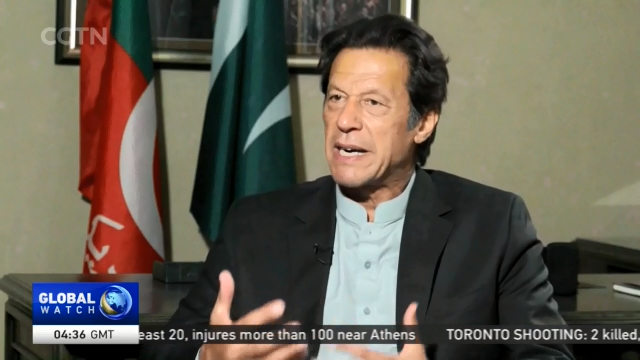
13:14, 24-Jul-2018
Pakistan Election: Strong government and new leader expected as polls open Wednesday
Updated
12:51, 27-Jul-2018
03:14

Pakistan will hold the parliamentary elections and vote for a new prime minister on Wednesday. Cricket legend-turned-politican Imran Khan says he is confident of victory, and if elected as prime minister, would drive an anti-corruption and anti-poverty campaign. Khan is campaigning hard on populist promises of a prosperous Pakistan. Our correspondent Danial Khan has more.
Imran Khan has become the most popular candidates running for the prime ministership, hoping people will come in large numbers to vote for him.
IMRAN KHAN CHAIRMAN, PAKISTAN TEHRIK-E-INSAF "People will come because people are sick of corruption in this country and they have known for a long time that the ruling elite is corrupt, specifically Nawaz Sharif, is one of the biggest corrupt politicians of Pakistan. He's got a history of corruption. There are books written on his corruption. And people will come because they realize that corruption and Pakistan can no longer go together."
According to the constitution, a prime minister has to be elected by the next parliament. Following the elections, the president has 21 days to convene the national assembly. The new assembly will then vote to elect a prime minister. Experts say, Pakistanis should vote wisely.
DR. ASHFAQUE HASAN KHAN DEAN, NATIONAL UNIVERSITY OF SCIENCES & TECHNOLOGY "I think the people should look into a party and the leadership which can improve their lives, can make their lives easier, can make the country stronger, take the country forward, and gain respect in nations. So that's what kind of leadership we need, who is committed, respected, brutally honest and fiercely independent."
But a hung parliament also remains a possibility. If a candidate does not win with majority, the members of parliament will have a second poll to elect the prime minister. And electing a prime minister without a majority would mean an unstable government. But it is not new to Pakistan. In 2008, the Pakistan Peoples Party came in power with coalition of many smaller parties and independent candidates. But then the Pakistan Muslim League, led by former prime minister Nawaz Sharif decided to sit in opposition. The PTI, PPP and PML-N are the three largest parties in parliament, but they are not likely to make a coalition. With two of the three largest parties sitting in the opposition will only promote instability. A significant voter turnout could perhaps help reduce the uncertainty.
DANIAL KHAN ISLAMABAD, PAKISTAN "Experts say Pakistan needs a strong government to address the enormous political, economic, and security challenges that the country is faced with. But it is not clear if the people will get what they need and deserve. It would only depend on what happens on the polling day, with all parties hoping for free and fair elections. Danial Khan, CGTN, Islamabad."

SITEMAP
Copyright © 2018 CGTN. Beijing ICP prepared NO.16065310-3
Copyright © 2018 CGTN. Beijing ICP prepared NO.16065310-3